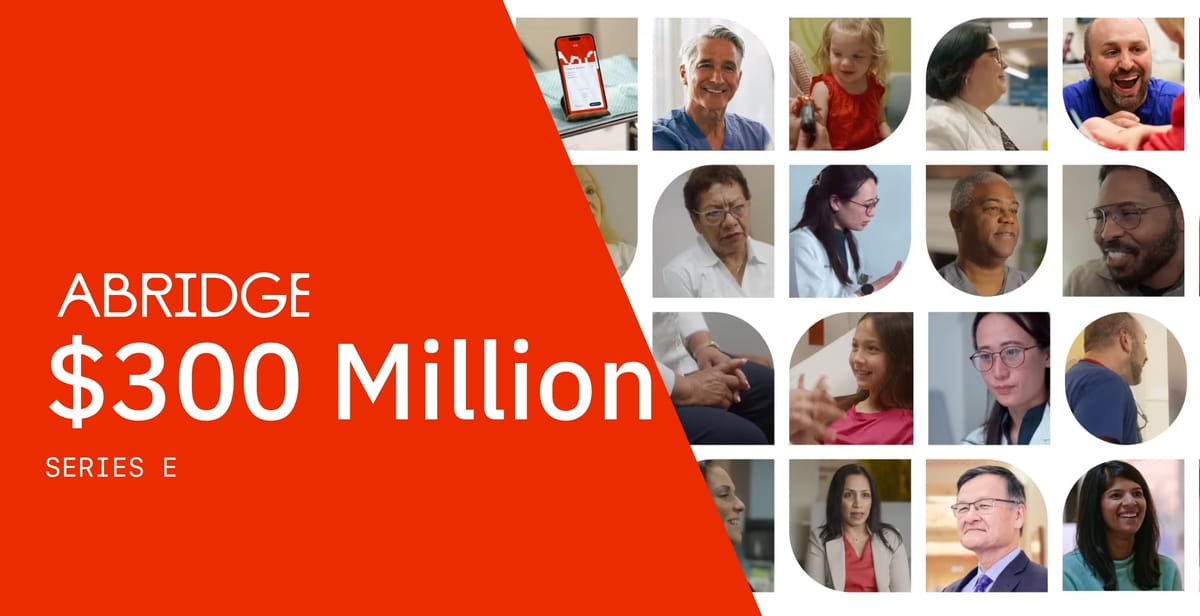
Four months ago Abridge was valued at $2.75 billion. Now, after a fresh $300 million led by Andreessen Horowitz—with Khosla Ventures re-upping—the note-taking startup has rocketed to a $5.3 billion price tag, making the deal one of the largest U.S. health-tech rounds of 2025.
- Doubled valuation in 4 months
- 150+ health systems already live
- Plans to expand to revenue cycle management and billing automation
"Every medical conversation is rich with the signals our healthcare system depends on," said Dr. Shiv Rao, Abridge's CEO and co-founder. "Abridge activates those signals in the background, silently handling the complexity so clinicians can focus on the human moments that matter."
Ambient listening—where AI sits in the background during doctor visits, transcribing conversations and generating clinical notes—has become table stakes for health systems in 2025. Nearly every major healthcare network is either using these tools or actively piloting them, driven by a physician burnout crisis that's pushing doctors to retire early or leave medicine entirely.
Abridge's pitch is simple but powerful: doctors activate the app before patient visits, and AI handles the rest. The technology listens to conversations, understands medical terminology across 55 specialties and 28 languages, then generates structured clinical notes that integrate directly into electronic health records. The company claims it reduces clinician burnout by 60-70%, with over 90% of doctors who try it continuing to use the platform.
But Abridge isn't just competing on basic transcription anymore. The company is using this funding to push deeper into revenue cycle management—the complex, expensive process of turning patient visits into insurance claims and payments. This is where the real money is: the U.S. healthcare system spends nearly $1.5 trillion annually on administrative costs, much of it tied to clinical documentation and billing workflows.
"By the time clinicians hear from coders and auditors about non-compliant documentation, the details are hard to recall and the adjustments are time-consuming," Rao explained. "That's why our models have gone to coding school, risk adjustment school, and utilization management school."
While competitors like Suki (valued at $400 million) and Augmedix focus primarily on transcription, Abridge is betting that health systems want end-to-end solutions that handle everything from notes to billing codes. Its deep integration with Epic—the dominant electronic health record system—gives it an edge that startups like Nabla and Suki lack.
That said, Abridge faces formidable competition from Microsoft's Nuance, which was acquired for $19.7 billion in 2022 and remains the dominant player with adoption across 77% of U.S. hospitals. Microsoft has been embedding its Dragon Ambient eXperience (DAX) Copilot directly into Epic systems, leveraging OpenAI's GPT-4 technology and its massive enterprise relationships.
The competitive landscape is fierce and getting more crowded. Ambience Healthcare raised $70 million in February at a $300 million valuation, while Suki closed $70 million in October. Even Google is pushing into the space with its healthcare-specific MedLM foundation models.
What's driving all this investor interest? The numbers are compelling. Abridge will support more than 50 million medical conversations this year across its 150+ health system partners, including Mayo Clinic, Duke Health, and Johns Hopkins Medicine. The company claims doctors using its platform save 70 hours per month on documentation—time they can spend with patients instead of keyboards.
"While the healthcare system has evolved over the last 30 years, the one constant has been rising costs and the growing burden on clinicians and patients alike," said David George, general partner at Andreessen Horowitz Growth. "Abridge eliminates inefficiencies at their source, directly in the clinical conversation."
The real test will be execution. Ambient AI has moved beyond the proof-of-concept phase—according to a recent MGMA poll, 28% of medical groups now use these tools, with many more planning to adopt them soon. The question isn't whether ambient AI will succeed, but which companies will dominate a market that's rapidly expanding beyond simple transcription into the complex world of healthcare finance and operations.
For Abridge, the $300 million war chest gives it the resources to compete with Microsoft's deep pockets while building the AI infrastructure needed to handle millions of medical conversations. Whether that's enough to challenge an entrenched incumbent remains to be seen, but investors are clearly betting that the ambient AI revolution is just getting started.

